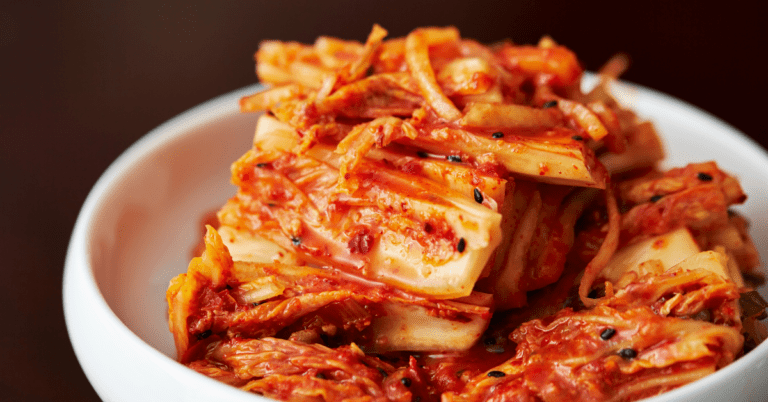Kimchi is a Korean dish made by fermenting vegetables with various seasonings. It is a staple of Korean cuisine and is served at almost every meal.
Kimchi is a popular food for many Koreans and is now becoming popular in other parts of the world as well. But is kimchi good for you? Here are some of the benefits you can expect from eating this traditional food, kimchi.
Understanding Kimchi: Why is it good for you?

What is kimchi??Kimchi is a Korean dish made from fermented vegetables.has existed for thousands of years. ofkimchi recipe Very easy to follow with just a few partsFermentation equipment. It is made by adding fish sauce, garlic, and red chili pepper to vegetables such as cabbage.
Kimchi, which is characterized by its spiciness and tangy sourness, goes perfectly with rice and is one of the most beloved Korean dishes due to its unique flavor, high nutritional value, and health benefits.
Known for its medicinal properties, kimchi can reduce symptoms of certain diseases, strengthen the immune system, and promote digestion. It is important to note that kimchi contains lactic acid bacteria that help break down food during digestion. In fact, consuming kimchi can help prevent postprandial bloating.
Additionally, kimchi’s fermentation process helps preserve vegetables naturally, greatly extending their shelf life. This property of kimchi is especially useful for people who want to prepare meals in large quantities or who want to reduce food waste. The fermentation process not only enhances flavor, but also helps preserve food, making it a practical and healthy option.
The main ingredient of kimchi, cabbage, is rich in dietary fiber, which makes kimchi delicious.lower cholesterol levels Activation in the body leads to cancer prevention. Kimchi not only lowers cholesterol levels but alsolower blood pressure.
But that’s not all! Let’s explore the many other benefits of kimchi.

Explore the nutritional benefits of kimchi:

Kimchi is made by salting vegetables such as cabbage, radish, and cucumber and fermenting them with lactic acid bacteria.The fermentation process increases the vitamin content and makes kimchi easier to digest. The main nutritional benefits of kimchi are:
Kimchi provides a variety of antioxidants, including beta-carotene, which fights free radicals. It also provides other antioxidants and disease-fighting compounds. Researchers have found that antioxidants in kimchi produced during fermentation may protect against oxidative stress and reduce the risk of chronic diseases such as heart disease and cancer. Kimchi provides calcium, which promotes bone health. Kimchi is also a good source of iron, which promotes oxygen transport in the body. Kimchi is a rich source of potassium, which helps lower blood pressure. Kimchi also contains vitamin C, which boosts immunity. Kimchi contains folic acid, which is necessary for maintaining healthy red blood cells, as well as vitamin A, thiamin (vitamin B1), riboflavin (vitamin B2), niacin (vitamin B3), and pyridoxine (vitamin B6), which keep us healthy. Contains several important vitamins. . In addition to the above, kimchi is also rich in dietary fiber. Dietary fiber helps promote regular bowel movements, lower cholesterol levels, control blood sugar levels, maintain gut health, and help you achieve a healthy weight.
Kimchi nutritional information (per 100g):
calorie
15K calories
macronutrients
vitamin
mineral
fat
saturated fat
omega 3
omega 6
0.5g
vitamin A
5μg
calcium
33mg
0.067g
Vitamin B1
0.01mg
copper
0.024mg
0.14g
vitamin B2
0.21mg
iron
2.5mg
0.1g
vitamin B3
1.1mg
magnesium
14mg
carbohydrates
2.4g
vitamin B6
0.21mg
phosphorus
24mg
1.06g
vitamin B9
52μg
potassium
151mg
1.6g
vitamin E
0.11mg
selenium
0.5μg
protein
1.1g
vitamin K
43.6μg
sodium
498mg
zinc
0.22mg
Unleash the probiotic power of kimchi:

Probiotics are live microorganisms that are beneficial to us. It helps keep our bodies healthy by making food easier to digest. It also increases the number of “good bacteria” in your intestines and boosts your immune system.
Probiotics are most commonly associated with yogurt and other fermented foods such as kefir and kombucha. Kimchi is also rich in probiotics. However, many bottled kimchi available at grocery stores are heated during the packaging process, which kills these probiotic microorganisms. Therefore, we recommend that you try making your own kimchi.
Make delicious fermented vegetables at home with the DIY Fermented Vegetables Kit! This kit is also perfect for making kimchi, sauerkraut, and more. Equipment in the kit may differ from the photo. Kit includes: Half gallon fermentation jar Airlock lid with rubber grommet Ceramic fermentation weights Celtic sea salt Recipe card Instructions…
These beneficial bacteria are the result of a process called lactic acid fermentation, which occurs when vegetables such as cabbage are salted and left at room temperature for several days. During this process, lactic acid bacteria (LAB) are produced.
LAB has many health benefits, including: anti-inflammatory properties and reduced cholesterol. It is also effective in improving the immune system and preventing avian influenza (bird flu).
The probiotics contained in kimchi are has been proven This medicine reduces the amount of enzymes that activate carcinogens and suppresses the growth of pathogenic (bad) bacteria in the intestines.
Kimchi weight loss and metabolic benefits:

Yes, kimchi can help you lose weight and boost your metabolism.
Kimchi has been studied for health benefits such as weight loss and boosting metabolism. in oneStudy of 22 overweight and obese patientsresearchers found that eating fermented or raw kimchi every day for four weeks reduced body fat percentage and waist circumference.
In addition to weight loss, kimchi is also low in calories. One serving (150 grams) of kimchi has about 40 calories, so it is highly nutritious and can be eaten as a filling snack or side dish without worrying about gaining weight. Kimchi has low energy density and high nutritional value, making it an ideal food for people who want to maintain a healthy weight or get slim.
Kimchi is home to beneficial bacteria called lactic acid bacteria that aid in digestion. Researchers have found that kimchi boosts metabolism and helps with weight loss. They attribute this to the probiotic bacteria found in kimchi. These bacteria help break down food and extract more energy from it.
Additionally, kimchi is rich in dietary fiber, which makes you feel full when you eat it. Additionally, fiber helps boost your metabolism. actual, Research published in 2009 Participants who consumed a high-fiber diet were found to have lower body weight than those who consumed a low-fiber diet.
Related sources: Is kimchi gluten-free?
How kimchi helps heart health:

The main benefit of kimchi is that it is rich in heart-healthy probiotics. Some studies have shown that kimchi may lower inflammation and cholesterol levels, lowering your risk of heart disease and stroke. The fermentation process in kimchi contributes to high levels of antioxidants, which reduce inflammation and protect the body from free radical damage.
Studies have shown that the beneficial bacteria produced during fermentation also help regulate blood lipid levels, reducing the risk of developing cardiovascular disease. This effect, combined with kimchi’s anti-inflammatory properties, may contribute to the overall heart health benefits of this flavorful dish.
Other studies have found that eating kimchi can cause the following symptoms:Helps prevent cancer cells It inhibits proliferation by inhibiting cell division.
Additionally, kimchi can also significantly lower cholesterol levels. A study in mice showed that kimchi potentially has the following effects:lower cholesterol levels It also suppresses fat accumulation in the liver.
Benefits of kimchi in diabetes management:
Kimchi has also been shown to lower blood sugar levels and help control diabetes. The fermentation process in kimchi breaks down the vegetable carbohydrates into simple sugars that are easier for the body to digest. This helps lower blood sugar levels and improve glucose tolerance in type 2 diabetics.
In a four-week study, rats who ate freeze-dried kimchi along with a high-fat diet better blood sugar controlBetter than a mouse that didn’t eat kimchi. Their blood sugar levels were lower and they responded better to insulin.
Another study found that eating kimchi in people with prediabetes had beneficial effects on several factors, including: glucose metabolism. The study also showed that fermented kimchi (more nutritious than raw kimchi) may improve blood pressure and insulin sensitivity.
Final word: Does kimchi have any benefits?
Yes, kimchi is good for you. Kimchi has many health benefits. It is touted as a superfood due to its anti-inflammatory and antioxidant properties. It’s also rich in probiotic bacteria, which can help boost your immune system, reduce inflammation, and even lower cholesterol.
Kimchi also contains nutrients and minerals such as vitamin A, thiamin (vitamin B1), riboflavin (vitamin B2), niacin (vitamin B3), pyridoxine (vitamin B6), folic acid (vitamin B9), calcium, iron, potassium, and phosphorus. Contains abundant. ,magnesium.
The best part? Kimchi is also easy to make at home. All you need is a little fermentation equipment and a few ingredients and you’re ready to go.
Now, let’s make this delicious Korean dish!


